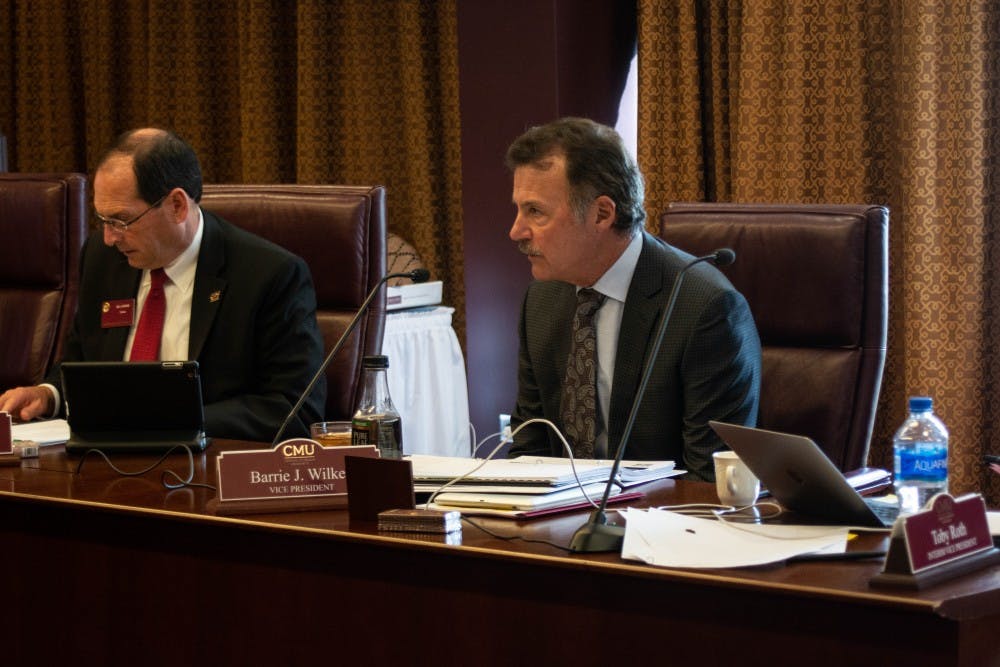CMU Board of Trustees committees discuss Chippewa Champions Alumni Center, closing Barnes Hall

Vice President of Finance and Administrative Services Barrie Wilkes speaks at a Board of Trustees committee meeting on Sept. 26 in the President's Conference Room.
Central Michigan University's Board of Trustees held committee meetings Sept. 26 to discuss closing Barnes Hall, building the Chippewa Champions Alumni Center and academic advising.
Trustees discussed the possibility of decommissioning Barnes Hall.
Vice President of Finance and Administrative Services Barrie Wilkes said Barnes is the oldest residence hall and the only dormitory-style housing on campus. The building is not compliant with the Americans With Disabilities Act.
A problem Wilkes discussed was the lack of space for sophomores if CMU decides to require freshmen and sophomores to live on campus. Requiring sophomores to live on campus without adding space in the residence halls would limit the number of students CMU could accept.
Wilkes is exploring the idea of adding 500 beds to the south campus community alongside an expansion of the south dining hall. These renovations could cost $85 million, Wilkes said.
Academic and Student Affairs Committee
"How do we structure our advising to better support students?" asked Ian Davison, interim senior vice provost for academic affairs. "How do we organize it? What are the roles professional advisers play? What are the roles the faculty play? What roles can technology play?"
Davison said strengthening advising is a key component in ensuring student success. In 2019, students will meet with advisers at orientation, once a semester their freshman year and once every year after. This is part of an effort to help students graduate sooner and increase retention rates, Davison said.
Interim Dean of College of Education and Human Services Elizabeth Kirby said the college added a new center for administration and leadership studies.
CMU will be the first university in Michigan to receive accreditation from the National Association of the Education of Young Children.
Finance and Facilities Committee
The Chippewa Champions Alumni Center was also discussed. The new facility would be more than just a locker room, Vice President for Advancement Bob Martin said. The project would include new learning facilities for students in athletic training, a new video scoreboard for Kelly/Shorts Stadium and areas for faculty and students to collaborate.
The Chippewa Champions Alumni Center would replace Carlin Alumni House, moving the offices of approximately 40 employees, Martin said.
Wilkes said upon approval, the construction would not require money intended for academic departments. Instead, funding for the center will come from "construction reserves," Wilkes said.
Trustees-Faculty Liaison Committee
Faculty and board of trustees members debated whether CMU’s priorities should be about academic orientation for students or increasing diversity.
Biology faculty member Bradley Swanson and Sociology faculty member Mary Senter said it would be beneficial for students to add onto the current academic orientation.
“We have something, but it is insufficient for what we really need to do,” Swanson said.
This revamped orientation would not just be putting together schedules for freshman year, but also learning practical skills like how to use the library, how to take notes, what the Academic Integrity Policy is and why general education “soft skills” are important.
Senter and Trustee William Weideman agreed diversity is important. They discussed a report, “Black Students at Public Colleges and Universities,” which rated CMU a C or D on three of four dimensions. These ratings are from the perspective of African American students.
“If the institution is going to say it’s committed to diversity, one has to be committed to diversity,” said Senter.
Honors program director Phame Camarena explained why the Honors Program is beneficial for students and how it helps recruit more families to CMU.
Honors program students make up less than 5 percent of the student body but account for 63 percent of all President and Provost awards and 50 percent of the summer scholars, Camarena said.
“The Honors program is absolutely essential in enhancing the academic reputation for Central,” said President Robert Davies.
Trustees-Student Liaison Committee
The trustees received an update from Student Government Association, Program Board and the Residence Hall Assembly.
SGA President Jake Hendricks said SGA is promoting civic engagement at CMU and in the community. SGA plans to hold a conference on Nov. 10 with student government members from peer universities.
Vice President Lyndi Rose told the board about SGA’s Menstrual Hygiene Product Initiative. SGA approved $1,500 to be spent on the initiative, and supplies will tentatively be delivered on Dec. 1.
Program Board President Galen Miller said the organization wants to focus on larger events this year. Some events include the Student Body Ball and a financial wellness program.
RHA director Mary St. John discussed adding card readers on every residence hall door. St. John said most students think the change is inconvenient, but also safer.
Staff Reporters Bridget Bittman and Nicole Lenz contributed to this article.



